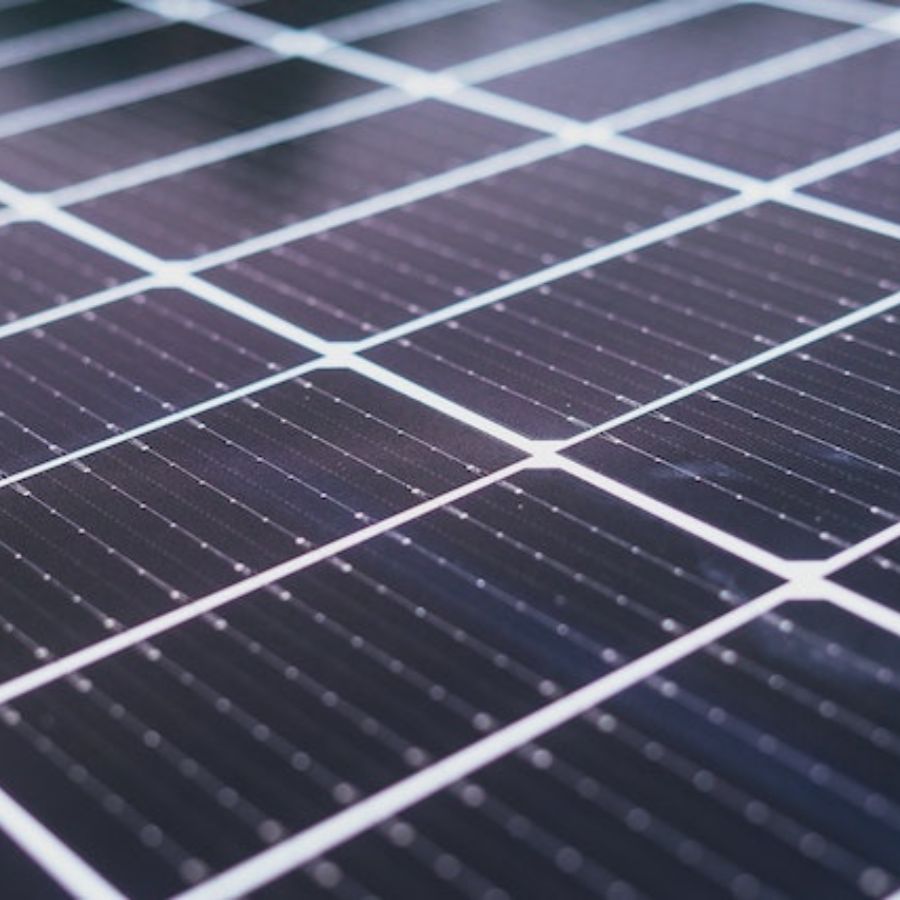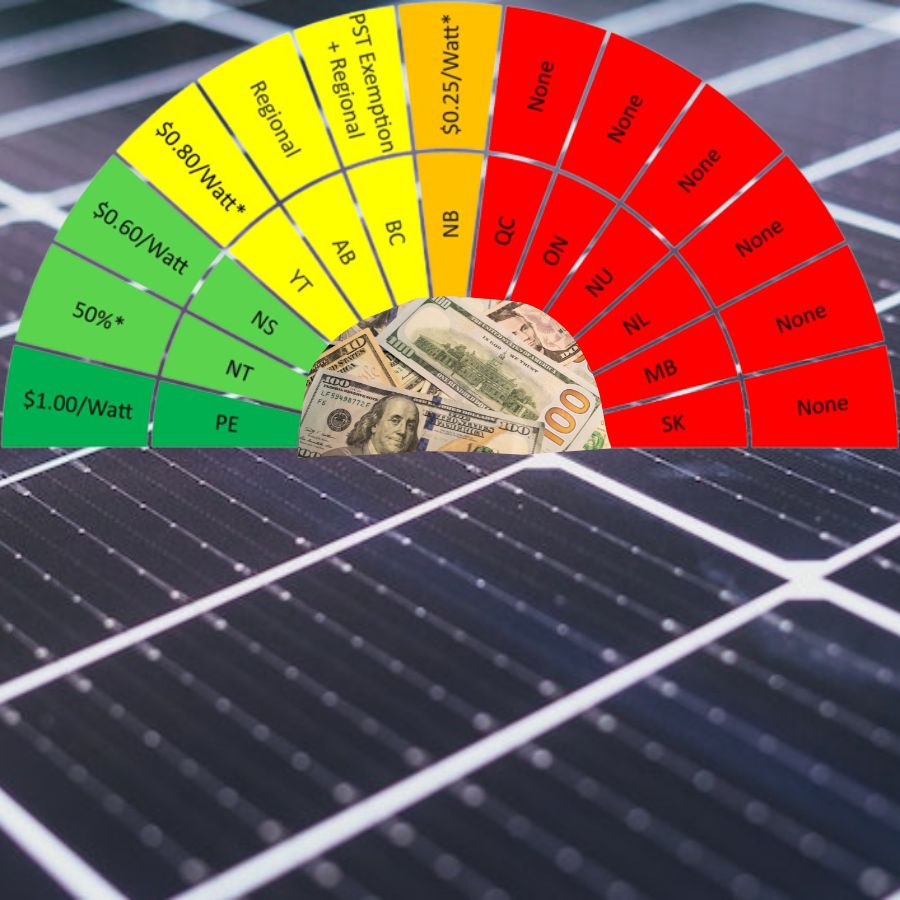Solar panel rebates are financial incentives governments and utility companies offer to encourage solar power adoption. These rebates make it easier and more affordable for homeowners and businesses to install solar panels and solar systems.
In British Columbia, solar panel rebate programs are available to support the switch to clean energy and reduce greenhouse gas emissions. Installing solar panels can also increase the value of a property and provide long-term energy savings.
Types of Solar Panel Rebates in BC
Several types of solar panel rebates are available in British Columbia to support solar panel installations. These include provincial rebates, municipal rebates, federal rebates, tax credits, and net metering.
Provincial Rebates
The province of British Columbia offers several incentives to encourage homeowners and businesses to invest in solar energy systems.
The most popular rebate is the BC Hydro Net Metering program, which allows homeowners to generate their own electricity using PV panels and sell any excess energy back to the grid. The BC Hydro program also offers a rebate of up to $1,200 for installing a solar power system.
Municipal Rebates
Some municipalities in BC offer their own rebate programs to support the installation of solar panels. These programs supplement provincial and federal incentives and provide additional financial support to homeowners and businesses.
For example, the City of Vancouver offers eligible homeowners a solar panel installation rebate of up to $2,000.
Federal Rebates
The federal government also provides rebates to encourage the adoption of solar energy systems. For example, the Canada Greener Homes Grants program offers rebates of up to $5,000 for eligible homeowners to make energy efficiency upgrades to their homes, including installing solar panels.
In addition, businesses can apply for the Commercial Solar Incentive program, which offers rebates for installing solar photovoltaic panels on commercial buildings.
Tax Credits
In addition to rebates, tax credits are available to those who install energy-efficient solar power systems. For example, the enhanced depreciation tax credit allows businesses to deduct the cost of installing a solar system from their income profits.
Homeowners may also be eligible for a PST tax exemption on the cost of purchasing and installing a solar system.
Net Metering
Net metering is a program that allows homeowners and businesses to generate their own electricity using PV panels and sell any excess energy back to the grid. This program can help reduce energy bills and provide long-term energy savings.
Net metering is available through BC Hydro and other local utility companies in British Columbia.
Eligibility Criteria for Solar Panel Rebates in British Columbia

Specific criteria need to be met to be eligible for solar panel rebates in British Columbia. These criteria vary depending on the type of rebate program being applied for.
Residential and Commercial Property Requirements
Generally, residential and commercial properties are eligible for solar panel rebates in BC. However, the eligibility criteria for each type of property may differ.
For instance, in some cases, the property must be owned by the applicant, while in other cases, the applicant may be eligible even if they are renting the property. Therefore, it is essential to carefully review the eligibility requirements for each program to determine if a property qualifies.
System Size and Capacity Requirements
There are typically minimum and maximum requirements for the size and capacity of the solar energy system to qualify for rebates. For instance, some programs may require a minimum system size of 2 kilowatts, while others may require a maximum size of 10 kilowatts.
Again, it is essential to carefully review the eligibility requirements for each program to determine if the installed solar system meets the size and capacity requirements.
Solar Panel and Equipment Standards
Solar panels and equipment used in the solar system installation must meet specific standards and certifications to be eligible for rebates. The conversion of sunlight into direct current electrical energy is the primary mechanism by which a solar panel generates power.
For instance, solar panels must be certified by the Canadian Standards Association (CSA) or the Underwriters Laboratories of Canada (ULC). In addition, the inverter used in the system must also be certified by the CSA or ULC.
It is vital to ensure that the PV panels and equipment being used in the installation meet the required standards and certifications.
Installation and Compliance Requirements
A licensed and certified professional must install the solar system to be eligible for rebates. The installation must also comply with all applicable building and electrical codes and safety standards. The structure must also be inspected and approved by the local building department or electrical safety authority.
It is important to carefully review the eligibility criteria for each solar panel rebate program in British Columbia before deciding to install a solar system. By ensuring that the property, system size, solar panels and equipment, and installation meet the eligibility requirements, applicants can increase their chances of receiving rebates and reducing the cost of installing solar panels.s
How to Apply for Solar Panels Rebates in British Columbia

Applying for solar panel rebates in British Columbia can be straightforward if you follow the required steps and provide the necessary documentation. Here are the steps to follow when applying for solar panel rebates in British Columbia:
Consult With a Solar Installer
Before applying for rebates, it’s essential to consult with a qualified solar installer to assess your property’s solar potential and provide an estimate for the cost of installing solar panels.
Check Your Eligibility
Review the eligibility criteria for the various rebate programs available in British Columbia to ensure that you qualify for the program you’re interested in. Eligibility requirements may vary depending on the program.
Obtain The Necessary Permits
Depending on your local jurisdiction, you may need to obtain a building or electrical permit before installing solar power on your property. Check with your local government or a solar installer to determine the required permits.
Purchase and Install PV Panels
Once you have obtained the necessary permits, purchase and install energy-efficient solar panels on your property. Work with a qualified solar installer to ensure your solar PV systems are installed correctly and meet all safety standards.
Gather Required Documentation
When applying for solar panel rebates BC, you must provide documentation verifying your eligibility and installing your solar panels. Required documentation may include proof of ownership, permits, and a detailed invoice from your solar installer.
Submit Your Application
After you have gathered all the necessary documentation, submit your rebate application to the appropriate program administrator. Follow all application instructions carefully and double-check that you have included all required documentation.
When applying for solar panel rebates, it’s essential to avoid common mistakes that can delay or disqualify your application. Some common mistakes to avoid include:
- Failing to meet eligibility requirements.
- Providing incomplete or inaccurate documentation.
- Failing to follow application instructions.


Leave a Reply